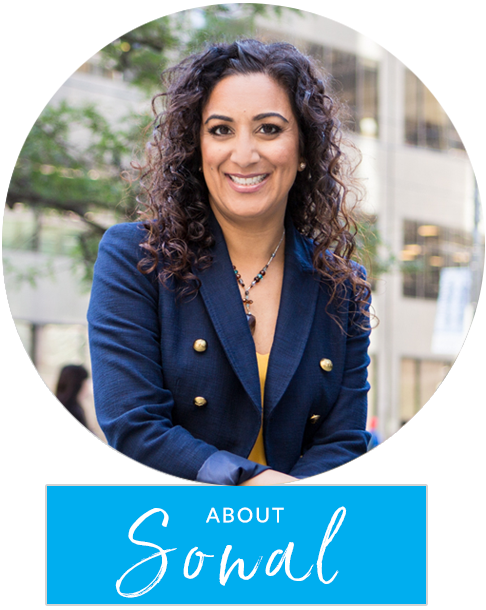Today marks my two-year anniversary of leaving the corporate world to start my business as a Leadership Coach and Facilitator. I often get asked if I have any regrets about my decision and the answer is still (thankfully) no. I appreciated and learned a lot during my time in corporate and I’ve learned a lot more about myself in the last two years.
As I reflected this week upon my journey, I came up with four things I would tell my younger self…if only I could find a time machine to take me back about 17 years!
1. Self-promotion doesn’t have to be icky
Yes, I used the word “icky” because that’s the best word to describe how I felt about it.
Outside of formal performance reviews, I didn’t always do the best job of showcasing my work. I remember saying things like “My work should speak for itself” or “I don’t want to play the game”. Talking about my accomplishments felt egotistical and I often used “we” instead of “I”, giving credit to others. While my direct managers knew about my main projects, many of my contributions and abilities went unnoticed.
Now I have a different perspective. Rather than thinking about “self-promotion”, I think of it as “visibility”. How might what I’m doing be of service to others? How can I share what I have learned? How might others benefit from my mistakes? How might my talents be useful to the organization? To the world? When I view it from this lens, I show up differently.
What’s your current perspective on self-promotion?
2. Asking for help does not mean weakness
Really.
I had one “bad” year in my career. It was the year I took over as the lead Marketer on an important brand and we went from a headcount of two to one. I was also dealing with a rough breakup and didn’t tell anyone at work.
Why?
I was fiercely independent and perfectly capable of handling it all. If I asked for help, people might think I couldn’t handle the increased responsibilities. If I asked for help, my ego and pride would suffer. If I told people about my break-up, they might feel sorry for me. Ugh! Better to suppress what I was feeling and throw myself into work.
What I didn’t realize is that who I was being had the opposite impact of what I wanted. I was becoming more frustrated and I wasn’t fooling anyone. In fact, some thought I was disengaged and negative. I was just overwhelmed and anxious…but nobody knew that.
What I’ve learned is that another perspective serves me more. I always feel great when I help people who ask for it. Why deny others the opportunity to feel great? It doesn’t take anything away from me.
And what I’ve found is that showing my vulnerability makes me more relatable.
What’s your relationship with asking for help?
3. What you focus on expands
I get more of whatever it is I am focusing on.
There were times in my career where things did not go my way. What I’ve realized is the more time and attention I gave it, the more I brought it to life. The more I talked about it, the worse I felt. The worse I felt, the more things didn’t go my way.
The opposite is also true.
When things are going well, I feel good. When I feel good, I have a greater impact on people. When I have an impact on people, my energy is higher. When my energy is higher, more opportunities come to me.
I can’t change circumstances but I can change how I react to them.
Now when things don’t go my way, I acknowledge and feel the emotion I’m feeling (anger, frustration etc.) and then I do things that shift my focus. Things that work for me include: making a gratitude list, playing music that changes my energy, making a mental list of all the things that are working for me etc.
It takes discipline to find the gift in any circumstance and it feels a lot better. I can feel good even when things don’t turn out the way I wanted.
What do you do when things don’t go your way?
4. Build up your Inner Team
I always had a big team of Inner Critics running the show.
Whenever I didn’t get external validation, I would feel like I wasn’t doing a good job. “You’re not smart enough, talented enough, liked enough”. When I made “mistakes”, I would agonize over them for days. “You weren’t careful enough, you should have…”. My Inner Critics convinced me the answer was always to push myself harder and aim for perfection.
And I believed them.
What I’ve learned is that I also have creative and resourceful parts of me that I call my Inner Team of Champions. I’m visual so I’ve even given them characters and roles.
Dumbledore is the wise part of me that is compassionate and reminds me that things always work out just fine. Flash the Sloth is deliberate and helps slow me down when I’m getting worked up. Katniss is the courageous part of me who is fierce and gets me out of my comfort zone. FYI, she’s here right now to counteract the anxiety I feel when I’m about to post an article! And Jessica Rabbit is…well, maybe I’ll tell you about her and my other Champions another time!
The point is that when I feel my Inner Critics coming to the front of the stage, I call in one of my Champions. The more I do this, the lower the impact of my Inner Critics. I know they will always be there but I don’t have to listen to them or believe their lies.
So take that, you pesky Inner Critics!
Who do you need on your Inner Team at this point in your career or life?


